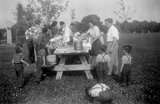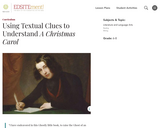Driving question:What is the most irrelevant theme to today's modern society from The Great Gatsby?Purpose:1. Students to think critically and analytically.2. Students to gain a more in-depth understanding of how to find themes within texts and be able to have a deeper connection with modern society. Standards: 1) 9-10. RL. 2.2: Analyze in detail the development of two or more themes or central ideas over the course of a work of literature, including how they emerge and are shaped and refined by specific details.2) 9-10.RN.4.3: Analyze seminal U.S. and world documents of historical and literacy significance, including how they address related themes and concepts. Grabbers: To show clips from the movie to highlight themes that will be assigned to students. These clips can be used as evidence for the students projects (video clips are in teacher materials tab).https://www.youtube.com/watch?v=jKs6tUxVC7M - Morals and American Dreamhttps://www.youtube.com/watch?v=jqA1ISMJJQY - Society and Class or Moralshttps://www.youtube.com/watch?v=uyZrLD_fDLY - materialism and Gender Roleshttps://www.youtube.com/watch?v=yH7eRHHVGGA - materialismhttps://www.youtube.com/watch?v=TTWumSE8GXM - moralityhttps://www.youtube.com/watch?v=MCxbZ8D7N1o - gender rolesLesson Summary:After the class has read the Great Gatsby, Groups of five will be assigned one main theme from the reading and they will have to support why they think their theme is the most relevant in today’s modern society. They will find sub arguments within the text in order to support this claim and present this information through a digital presentation. Students will also be required to use direct references and quotes to defend their answer. Groups should split up the work evenly and work collaboratively. Students will present their digital presentations to the class. Students will then have a debate taking the persuasive stance on why they think their theme is the most relevant and support it through evidence from their research. After the digital presentations are turned in, presented, and each student is informed by other group's theme in detail by the presentation and challanged by debate, students will write an individual reflection on what theme they personally think is the most relevant in today's society.Lesson Narrative:Introduction: Remind students of presentation expecptations and focuses on the central question asked - What is the most irrelevant theme to today’s modern society from The Great Gatsby?Presentations: Students representing groups that support the six themes from the book, (morality, American dream, society, class, materialism, and gender roles) give presentations that are informative, descriptive, and supported with evidence from the book and other outside sources to the class. Instructor: Asks leading questions during presentations to allow students to go more in depth on their theme. Addresses any questions or misinterpretations that occurred during the presentations. Debate: Each group will then be challenged by the other students of different themes and should argue why their theme is the most relevant in today's society. Each group should respectfully address one another and challenge each others ideas and to support their own with their evidence from their presentations. Each group should work together in order to work towards the goal of being the most relevant by collaboration.Instructor: The instructor uses questions to clarify factual claims, ask for supporting evidence, include other members within the class in the debate, and connect the presentations to the discussion to broaden the understanding of each theme/side to the book and it's relevance.Debriefing: The instructor again asks the driving question. Clarifies any confusion, questions, or misinterpretations raised during the debate. Then summarizes what happened during the debate and lets the class think about other group's stance on their themes. Culminating Activity:1. Provide closure for major driving question.2. Gives the opportunity for students to be persuasive and show their understanding of the lesson. Lesson SummaryAfter researching, presenting, and discussing the central driving question mentioned before, students should be able to write an individual essay based off of previous experience with the project. The individual essay will require the students to reflect on their understanding and take from their personal opinion on what they think the most relevant issue in The Great Gatsby to today's modern society. Example of Culminating ActivityA Persuasive EssayAnswer the following question as an individual reflection from the previous lesson: What is your personal opinion on what theme from the Great Gatsby is the most relevant in today's society? Now that you have researched, presented, and discussed extensively the main 6 themes from the Great Gatsby: morality, American dream, society, class, materialism, and gender roles, pick ONE of these themes and have sub-arguments, evidence, and quotes to support your opinion. This paper should be at least 5 paragraphs long, see guidelines below. The paper should be in MLA format and cited correctly. No direct quotes should be longer than three lines. Paragraph 1: Introduction - short summary of the book, thesis Paragraph 2: Sub-argument with evidence from book, movie, class presentations, debate, and other outside sources to support this argument. Paragraph 3: Sub-argument with evidence from book, movie, class presentations, debate, and other outside sources to support this argument.Paragraph 4: Sub-argument with evidence from book, movie, class presentations, debate, and other outside sources to support this argument. Paragraph 5: Conclusion - Wrap up thoughts, restate thesis







